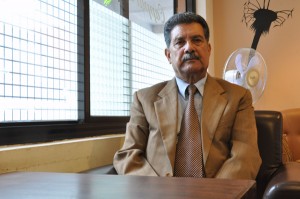It was a bright sunny day when Shambhu Prasad Poudyal, the Director of Nabil Bank,  walks into the coffee shop at 2:30pm, his grey tuxedo appearing suave and sophisticated, as usual, for the interview. Calm and collected, he settles down, orders a cappuccino. As we start our conversation, I notice that with spots of grey hair and fine lines on his face, he gives the impression of a wise, no nonsense kind of a person. And why shouldn’t he be? He has been a respectable figure in the banking industry for almost 35 years.
walks into the coffee shop at 2:30pm, his grey tuxedo appearing suave and sophisticated, as usual, for the interview. Calm and collected, he settles down, orders a cappuccino. As we start our conversation, I notice that with spots of grey hair and fine lines on his face, he gives the impression of a wise, no nonsense kind of a person. And why shouldn’t he be? He has been a respectable figure in the banking industry for almost 35 years.
Beginning the interview by discussing his family, I was told that Mr. Shambhu was born the second child in a family of three sons. When he was 4 years old, his mother passed away. Growing up, he shares fond memories of his father, who he claims to be his best friend and his inspiration. And now that he’s the father of two young adults himself, he feels he shares similar chemistry with his children.
Nabil Bank is known to be the first joint venture bank of Nepal. Running in its twenty sixth year, it has become one of the most successful commercial banks earning the good trust of its customers and providing quality service. Since he was elected the public director in 1986, Mr. Shambhu has been working with the bank close to its inception. He had been working assiduously in the banking sector even before Nabil. Starting his career at the Nepal Ratra Bank in 1982, he has worked with regulating institutions like Rastra Beema Sansthan in leading positions. He was also appointed the national advisor of national insurance committee by the Ministry of Finance.
Although he has worked with other corporations, a glance at his career path is telling that most of his years were spent in the banking sector. ‘Monetary institutes that are accountable to public’s interest need more sincere and honest people. That’s what enticed me to banking, initially,’ he explains. ‘In my younger years, more than anything, I knew I was a sincere and honest person and that I wanted to be in a position where I could represent the public, and make sure that their hard earned money was taken care of astutely.’ Headstrong on accountability and incisive, he shares that the perk of banking is born from the professional working environment it facilitates, and being able to deliver service at the right time.
We all know that these days, banks have become one of the most sought after workplaces for youth. He believes this is because of the lucrative salary range that they provide to their employees. ‘You compare the salary, and grooming opportunities given in banks to their employees with any other sector and you’ll see that banks will always be on top.’ Not just that, he believes it is also because banks now are equipped with many modern technologies in tune with the advanced world, which helps young minds flourish more than in most other institutions. It is only natural for the young and talented crème of the crop to be attracted to this sector.
But his message to those interested in joining banking sector is that ‘Just the idea of working in a bank is not enough make sure you are able to represent it! You can always learn and augment your knowledge, and skill. But always remember that hard work and sincerity is the key to becoming a good banker.’
Digressing to other things, we begin discussing his youthful years. Shambu smiles, sips his cappuccino and goes on, ‘When people look at my profile, they might assume that I was very serious, career oriented person, but I was very different from that.’ He then shared his love for sports, and lightened up the serious tone. He retold his stories of teen years playing soccer with friends, leading youth clubs and, with pride in his eyes, reclaims that his club was the first to introduce snooker in Nepal. As he spoke more of his achievements and involvements, including being member of the Red Cross Society and the mountaineering club, I couldn’t help but wonder how he must have been a leader and a role model even to people of his generation in his wonder years.
And now, after many years, he is still regarded as an inspiration by many in our generation. Upon asking him what message he has for today’s youth, he says ‘Youth are the power of the nation. For me, youth are not to be called youth because of their age but because of their stamina and their strength to stand up against the system to correct it. We didn’t have the exposure like you do and now that you have the technology and liberal minds at your disposal make sure you utilize that for the better. We were confined to studies, but now you have many more creative outlets to hone your abilities and potential. You have the time and people to support you.’
‘Kaam garna ko lagi janne hoina, janna ko lagi kaam garna parcha!’
